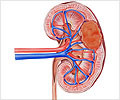Elective nephron-sparing surgery (NSS) is considered appropriate for small renal cell carcinoma (RCC) tumors; however, it is still difficult to detect high nuclear grade RCC preoperatively.
Although no specific tumor markers have been identified for RCC, immunosuppressive acidic protein (IAP) is a variable predictor of lymph node and distant metastasis in patients with RCC. At present it is impossible to determine the nuclear grade of RCC without removing the kidney.Researchers from the Department of Urology, Nihon University School of Medicine, Tokyo, Japan evaluated clinicopathologic factors in an effort to identify a potentially useful preoperative predictor of high nuclear grade RCC.
The investigation, published in the October issue of the journal Urology consisted of 181 patients with histologically confirmed clear cell RCC. The positive predictive value, sensitivity, and specificity for detecting nuclear grade RCC were calculated individually for the largest tumor diameter. Hemoglobin, alkaline phosphatase, C-reactive protein (CRP), ferritin, and IAP levels were also determined in all patients preoperatively. Results obtained showed that a higher than normal C-reactive protein and IAP was associated with a 252% and 405% increase in the odds of a high nuclear grade, respectively. In the Stage T1 cases, elevated IAP was also associated with a 989% increase in the odds of a high nuclear grade.
AP level may thus be a useful predictor for detecting high nuclear grade localized RCC preoperatively. The results of this study demonstrated the effectiveness of CRP and IAP measurement as a means to detect high nuclear grade RCC preoperatively.
Although this study included only a small number of cases, the authors believe that the measurement of these acute-phase reactants alone or in combination with other acute-phase reactants can be readily extended to clinical situations in which the maximal tumor diameter and other important assessments indicate a need for accurate detection of high nuclear grade RCC preoperatively.










